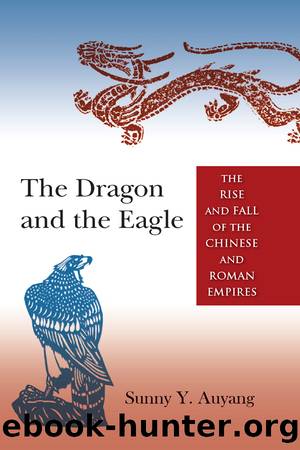The Dragon and the Eagle by Sunny Y. Auyang

Author:Sunny Y. Auyang
Language: eng
Format: epub
ISBN: 9781317516873
Publisher: Routledge
5.8 Colored Glasses of Historiography
Without conquests and big events, histories of empires tend to morph into serial biographies of emperors. A corollary of focusing on personal behavior instead of institutional and social conditions was the propensity of ancient historians, both Roman and Chinese, to explain events in moral terms. Vice was a favorite explanation for the demise of the Roman Republic and Empire, the Qin and Han Dynasties. On a smaller scale, historians tended to explain the working of a policy by the personality of its framer, for example attributing a tax policy to the emperor’s liberality or avarice.147 Tacitus treated the degeneration of Tiberius’s reign as an unveiling of hypocrisy; Ban Gu treated Wang Mang’s reign similarly.
Even in politics, a narrow focus on the emperor misses larger factors. To rule instead of merely to reign, an emperor had to work and perhaps struggle with his governing circle, which had its own dispositions. Tiberius was grim and rancorous, Wang arrogant and inclement, but these traits were not exceptional among powerful men. The warped personality with which each ended his life resulted not only from the corruption of power. Also important was reaction to his corrupt environment, the ring of aristocrats and officials full of intrigue, self-interest, and self-righteousness, exerting psychological pressure if not physical threat. Han literati regarded regulation of officials as malevolence. The major problem for an early Roman emperor was his relation with senators: as a modern historian remarks, “Whatever the acts and policy of a ruler at the outset, each reign went wrong soon or late. It is not easy to apportion the blame.”148 It is tempting to blame everything on the despot, who is safely dead. More illuminative of history is the politics of a dissolute ruling circle, where plots and counterplots, insecurity and preemptive strikes constitute a vicious spiral into calamity. Such political cultures, if not long-lived, can recur.
Tradition censures the last emperors of the Former Han Dynasty before Wang Mang’s usurpation in 9 CE. Intrigues and sexual licentiousness corrupted the court, but how did the empire fare? The literati painted grim pictures, which page after page Marxist historians collated with the conclusion, “the oppressed masses struggled on the edge of hunger and death, and history entered a dark period.”149 However, Ban Gu chose the 2 CE census as the sample of political geography in the Book of Han, adding, “The Han is at peak prosperity.”150 The cold statistics undoubtedly left out numerous instances of human suffering. Social and administrative deterioration did occur. Nevertheless, household registration was a sensitive measure of order and stability. A far darker period would come when desperate people fled their homes, seeking food or safety. The 65 percent drop in census figures half a century later indicates the significance of the big picture.151 Ban Biao, a historian who lived through the post-Wang civil war, explained why similar bedlam spared the Former Han during its last decades under bad emperors: “The danger started from the top, and the damages did not penetrate into the populace below.
Download
This site does not store any files on its server. We only index and link to content provided by other sites. Please contact the content providers to delete copyright contents if any and email us, we'll remove relevant links or contents immediately.
| African-American Studies | Asian American Studies |
| Disabled | Ethnic Studies |
| Hispanic American Studies | LGBT |
| Minority Studies | Native American Studies |
Cecilia; Or, Memoirs of an Heiress — Volume 1 by Fanny Burney(31333)
Cecilia; Or, Memoirs of an Heiress — Volume 3 by Fanny Burney(30934)
Cecilia; Or, Memoirs of an Heiress — Volume 2 by Fanny Burney(30889)
The Great Music City by Andrea Baker(21313)
We're Going to Need More Wine by Gabrielle Union(18073)
Bombshells: Glamour Girls of a Lifetime by Sullivan Steve(13108)
Pimp by Iceberg Slim(12931)
All the Missing Girls by Megan Miranda(12748)
Fifty Shades Freed by E L James(12451)
Norse Mythology by Gaiman Neil(11883)
Talking to Strangers by Malcolm Gladwell(11877)
Crazy Rich Asians by Kevin Kwan(8349)
Mindhunter: Inside the FBI's Elite Serial Crime Unit by John E. Douglas & Mark Olshaker(7834)
The Lost Art of Listening by Michael P. Nichols(6474)
Enlightenment Now: The Case for Reason, Science, Humanism, and Progress by Steven Pinker(6405)
Bad Blood by John Carreyrou(5769)
The Four Agreements by Don Miguel Ruiz(5511)
Weapons of Math Destruction by Cathy O'Neil(5037)
We Need to Talk by Celeste Headlee(4869)
